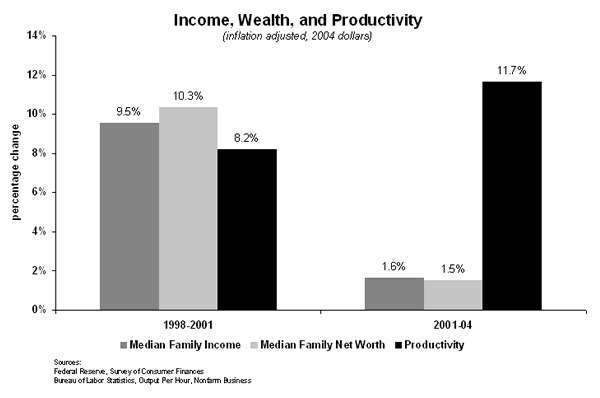See Snapshots Archive.
Snapshot for March 1, 2006.
Living standards not keeping pace with productivity
New data from the Federal Reserve’s Survey of Consumer Finances provide further evidence that the recovery hasn’t had much effect on living standards, as incomes hardly budged despite rapid productivity growth. The median household income rose just 1.6% between 2001 and 2004 (from $42,500 to $43,200 in 2004 dollars) compared to an 11.7% rise in productivity. Simply put, workers aren’t reaping the rewards of their labor: real wages are trailing productivity gains because profits are taking the lion’s share of economic growth (see Snapshot for April 21, 2005).

Growth in net worth has been equally lackluster, nudging up 1.5% to $93,100. Even this slight gain has been unevenly distributed because it stems entirely from a run-up in housing prices. Renters and families in regions like the south that have seen slower growth in housing prices had net decreases in wealth, while families in the northeast saw a dramatic increase, from $98,300 to $161,700. Meanwhile, savings—family holdings of financial assets—actually fell from $29,800 to $23,000, as fewer families reported saving in the past year and stock holdings languished.
The virtual suspension of growth in living standards contrasts with the previous three-year period (1998-2001), when family income rose 9.5% and wealth increased 10.3%.
The central role played by residential property, which constituted 39% of total assets in 2004 (up from 32% in 2001), means that families are increasingly vulnerable to a downturn in housing prices. If this downturn comes as a result of rising interest rates, households will be doubly impacted because the value of home-secured debt (for families that had any) rose by 27% over the three-year period.
This week’s Snapshot was written by Monique Morrissey.
